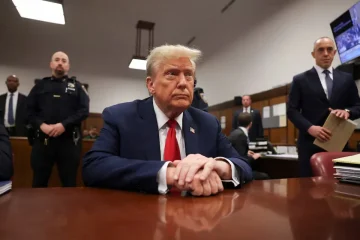ISRAEL called a November election after Prime Minister Naftali Bennett stepped aside and parliament was dissolved, while former premier Benjamin Netanyahu promised he would return to power.
Here is a quick look at why Israel is holding yet another election and what the chances are of a Netanyahu comeback:
HOW DID WE GET HERE … AGAIN?
Bennett and his partner Yair Lapid, who at midnight will assume the role of caretaker prime minister, took power last June, ending the record 12-year tenure of Netanyahu along with almost three years of political stalemate.
Bennett and Lapid wrangled up a broad range of hard-right, liberal and Arab parties into a government, but they lost their narrow majority to defections in recent weeks. Rather than wait for the opposition, led by Netanyahu, to vote them out, they moved to dissolve parliament and triggered the country’s fifth election in less than four years.
IS A NETANYAHU COMEBACK IN THE CARDS?
Perhaps. It’s unclear whether the landscape has changed enough over the past year to give Netanyahu an advantage. His conservative Likud is already the largest faction in parliament and is leading in the pre-election polls.
But no one party in Israel has ever won an outright majority and he would need support from others. His previous governments leaned on smaller right-wing and religious parties, but he failed to muster enough support in the four elections Israel held between 2019-2021.
ISN’T HE ON TRIAL?
Indeed. Netanyahu’s prospects may be clouded by his corruption trial on charges of bribery, fraud and breach of trust, which he vehemently denies. While the allegations have helped unite rivals against him, his base of supporters has been unwavering.
THE CAMPAIGN
The political map may of course shift leading up to the Nov. 1 ballot. Unexpected alliances or political newcomers could shake up the field. And one small party winning or falling short of the vote threshold for entering parliament could tip the balance either way.
Netanyahu, who frequently touts his security and economic credentials, has said his priority will be tackling a recent spike in living costs – a phenomenon being felt across the world – which he blamed on Bennett and Lapid’s government.
A poll aired on top-rated Channel 12 TV on Wednesday predicted Netanyahu coming slightly ahead in the election with control of 58 of parliament’s 120 seats – still short of a majority. Parties in the current coalition were seen getting 56 seats, with another six seats going to an Arab party unlikely to join either side.
A June 21 poll on the same channel found that 47% of Israelis deem Netanyahu best-suited for prime minister, 31% saw Lapid best-suited for the job, 4% said neither and 18% were undecided.













